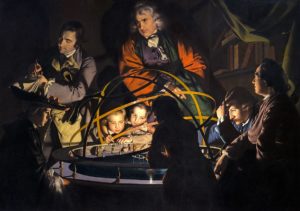 A Changing of Perspective
A Changing of Perspective
As the legitimacy of Rome was slowly fading, a new legitimacy was slowly rising. And by the time Rome was coming apart, it was being embraced by more and more people in Europe.
But before we go through the rise of Christianity (the new legitimacy), it’s important to understand that it wasn’t only the abusive governance of Rome that was failing: The old religions were losing their legitimacy as well.
Certainly the practice of the old religions continued, and many people still felt attached to them, but not so much that new religions didn’t find room to fill. A great number of new gods and religions popped up, and some of them were markedly different.
More than that, the concept of “God,” as in a single or primary god, rose to prominence. First of all, there were many Jews in the Roman empire, possibly as many as ten percent, and they were ardent monotheists – people who believed in only one god. And by this time even many polytheists were speaking and writing of god in the singular. They would generally think of this great or primary god as Zeus or Jupiter, but it was clearly a move away from strict polytheism and toward monotheism.
We can also bear in mind that the priests of the old gods were the same people who were abusing the old god’s adherents through politics, and behaving horribly at the same time. Not all of them were that way, but probably most of them were.
Now, it’s easy to read too much into this, imagining that personal goodness was essential to divine service, as so many people feel now. In the old days that was much less important to people, but it does appear that they were starting to care about such things at this time. And it was here that the Christians had a large advantage.
The old gods of Greece and Rome were often openly immoral. Their stories are full of lies, deceptions, unkindness and much worse. An early Christian named Tertullian wrote this in about 200 AD:
These actions of theirs… had they been living in these days, would have been condemned by all our laws.
Christianity offered people a purely good God, who moreover loved them and wanted desperately to help them. That was far more attractive to many people than capricious and immoral gods.
On top of that, Christians led virtuous lives, as did Jews. Being frequently-criticized outsiders, they picked up the habit of proving themselves right (or good) by being personally virtuous. A famous physician named Galen wrote this about the Christians, at about 200 AD:
The Christians… in self discipline, in matters of food and drink, and in their keen pursuit of justice, have attained a level not inferior to that of genuine philosophers.
And so, people who were gaining an interest in virtue also gained an interest in Christianity. And it seems that Christianity spread through Rome’s cities (east and west), mainly among the working class, increasing at a rate of 40 percent per decade.
Another very important aspect of Christianity was that Christians took care of one another, at a level far exceeding most of today’s Christianity. And Jews did nearly the same. The emperor Julian, the last Roman emperor to directly oppose Christianity, wrote this in 362 AD:
It is disgraceful that, when no Jew ever has to beg, and the impious Galileans (those are the Christians) support not only their own poor but ours as well, all men see that our people lack aid from us.
It was also the case that a large number of Romans were taking a serious interest in Judaism at this time. They didn’t want to convert fully (which would have required a special diet and circumcision for the men), but they were quite interested nonetheless. These people were generally called god-fearers, and there were so many of them that we’ve found inscriptions in Roman amphitheaters, identifying whole sections that were set aside for them. And for these people, Christianity provided the same things they admired in Judaism, but without dietary restrictions and circumcision.
And so, as Roman legitimacy was failing, the moral power of Christianity was rising.
Christianity was persecuted, on and off, from its first appearance in the city of Rome (at perhaps 49 AD), all the while growing at something like 40 percent per decade, as noted above. By 311 AD it was officially decriminalized, then adopted as the primary religion of Rome over the next century. Emperors used it to their own benefit of course, but the emperors faded away while Christianity remained.
By the time the western emperors had failed and the barbarian kingdoms were also failing, Christianity (and there were several forms of it) had spread almost all through Europe, as you can see in this map:

Dark blue indicates Christianity in 325 AD, Light blue Christianity in 600 AD
**
Paul Rosenberg
freemansperspective.com
